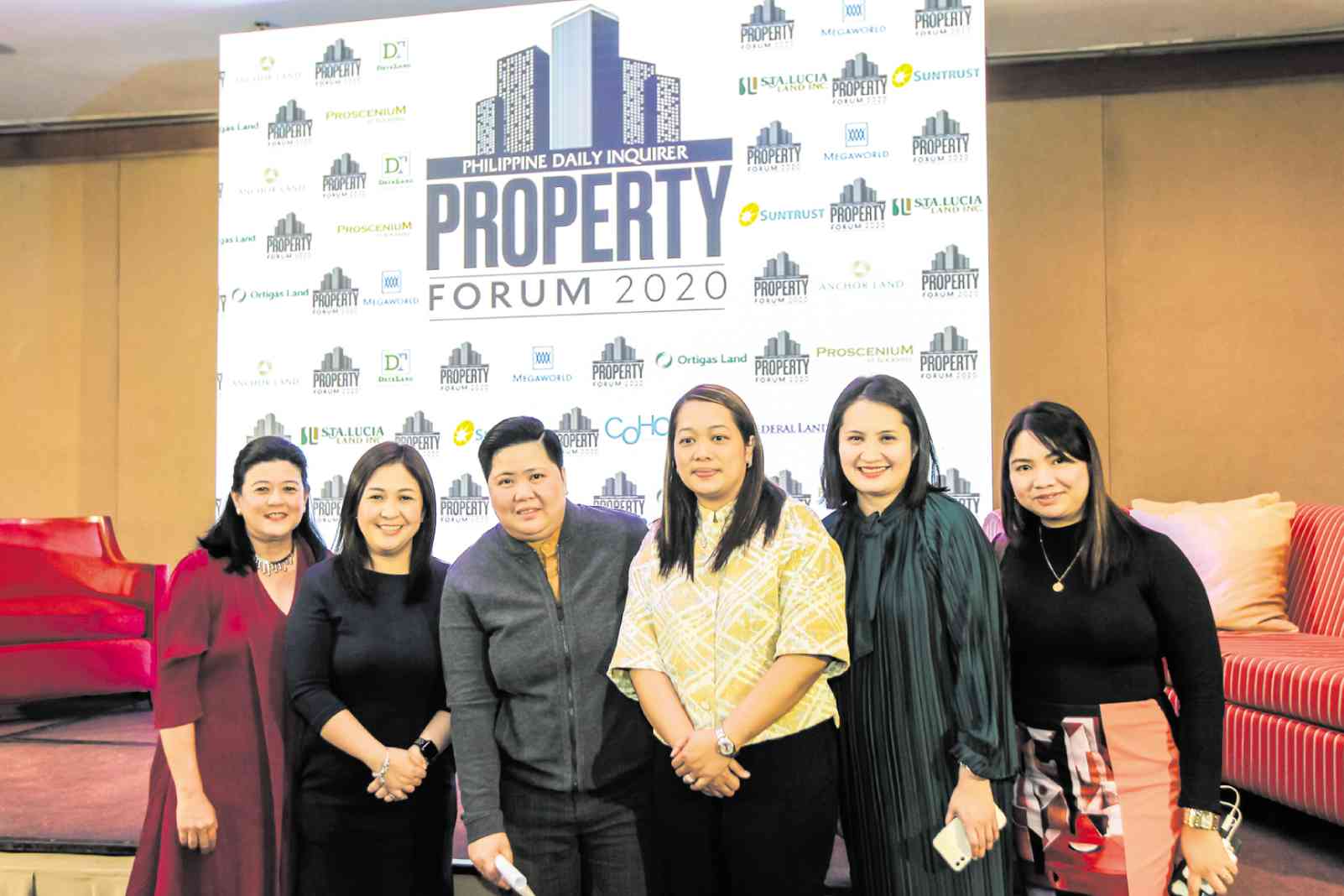‘State of real estate’ 2020

Inquirer president Alexandra Prieto-Romualdez expressed her gratitude to companies that supported the forum.—PHOTOS BY LEO M. SABANGAN
Outlook remains cautiously bullish, prospects continue to be bright, while most economic indicators point to a sustained, robust growth for the local real estate industry.
Add to the mix a strategic gameplan and you may have stakeholders and investors who are not only well equipped to anticipate and curb possible headwinds, but are also able to maximize the potentially lucrative opportunities presented by this highly dynamic sector.
Thus was the overriding theme of the discussions in the first Inquirer Property Forum entitled, “State of Real Estate: A Clear Vision for 2020,” which was held on Wednesday at the Manila Polo Club, Makati City.
Renowned industry experts Prof. Enrique Soriano III, executive director of Wong+ Bernstein Advisory Group, and Richard Raymundo, managing director of Colliers Interna-tional Philippines, were all forthright in forecasting the tailwinds, as well as in presenting the challenges that could potentially dampen growth amid an ever evolving real estate landscape.
Tailwinds, headwinds
Raymundo broke down his discussion into three to cover offices, residential and retail.
He reported that opportunities abound for the office property market given the growing presence of Philippine offshore gaming operators (Pogos), which are driving both demand and prices. For 2020, Colliers sees at least a third of all office space transactions coming from Pogos, which should contribute to acceleration of lease rates in key hubs (Bay Area, Ortigas Center, and Quezon City).
The ongoing expansion of business process outsourcing (BPO) and knowledge process outsourcing (KPO) companies amid uncertainties in the fiscal regime is also seen to help fuel the demand for office spaces. Other factors that may sustain growth include the growing popularity of—or preference for—flexible work-spaces, and the rise of the fringe locations that can offer a more affordable alternative to companies.
But what could potentially cloud the growth in this segment is the moratorium on Pogos in some cities and on the issuance of Philippine Economic Zone Authority (Peza) accreditations in Metro Manila, which was supposedly part of the government’s decentralization plan to push stronger economic activity in the suburban areas.
On the residential space, Metro Manila continues to have enough room for growth as prices here remain “affordable” relative to other key cities.
Raymundo cited as an example Manila’s most expensive residential property today: The Estate Makati, which currently offers units priced at a whopping P550,000 per sqm. Residential prices in Bangkok, he said, are twice that of The Estate; Singapore’s three times higher; New York’s about 10 times; London’s 15 times; while the country’s neighbor Hong Kong is 20 times higher than The Estate’s average price level.
He further pointed out an emerging growth driver in this segment: the halfway houses and co-living spaces, which have become a more attractive option for those who normally have to endure four to six hours of horrendous traffic every day to go to work in central business districts and back home.
What may dampen growth, however, would be the moratorium on Pogos as their employees account for a chunk of condominium take up in Metro Manila; possible delays in the government’s infrastructure initiative; and the high land values which may hamper landbanking activities of developers.
Finally, the retail segment offers it own share of prospects and challenges for developers. Among the concerns cited was the possible demise of the department store once e-commerce, online shopping and digital experience take precedence eventually. While this may however be far into the future, it’s best for developers to find ways to integrate such features in their respective operations.
Gameplan
While Raymundo focused on data and hard facts, Soriano meanwhile delved on the need to have clear-cut strategies to ensure that one is well equipped to thrive in a changing landscape.
According to Soriano, fast growing cities such as Metro Manila, will present a wider range of risk and return opportunities in real estate. But imperative to maximizing these opportunities would be to have a smart, ingenious gameplan that would harness the benefits of technology, incorporate innovation and sustainability in the company’s core operations, and would collaborate with the local and national governments.
As Soriano would often reiterate in his articles for Inquirer, a gameplan is a company’s best friend: the industry is fraught with uncertainties and competition is becoming intense.
It would also be imperative to take note of demographic shifts as well as changing preferences of today’s market, such as the growing need for pockets of nature and open spaces, energy efficient homes, sustainable communities and smart cities.
“Real estate players will need a higher degree of specialist expertise in their chosen areas and locations of activity, plus greater foresight to identify investment trends at an early stage within each market,” Soriano said in the forum.
Feng shui tips
Inquirer columnist and Property Section ambassador Tessa Prieto-Valdes meanwhile surprised attendees with a brief talk about feng shui—how one can usher in luck into their homes and buildings in the Year of the Metal Rat, the first animal in the Chinese zodiac hierarchy.
Valdes offered practical tips (see story on page B2-2), while stressing to an animated audience the importance of positivity, particularly in the first 15 days of the new year, to attract luck throughout the next 12 years.
The forum was formally opened by Property Section editor Maria Theresa Samaniego, who urged property developers to build more sustainably as this was key to helping improve the lives of Filipino homeowners while future proofing cities.
Inquirer president Alexandra Prieto-Romualdez, in her closing remarks, meanwhile expressed gratitude to the companies that supported the forum including Anchor Land Holdings Inc., DataLand Inc., Megaworld Corp., Ortigas Land, Rockwell Land Corp., Sta. Lucia Land Inc. and Suntrust Properties Inc. Minor sponsors were Century Properties Inc., COHO by Vista Land and Federal Land.






